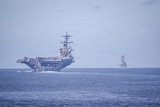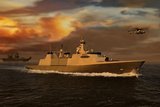UK RAF and NATO members assess SeaVue
Raytheon's SeaVue radar can be installed onto uncrewed vehicles for maritime surveillance. (Photo: Raytheon)
Raytheon has successfully demonstrated its maritime surveillance systems onboard the MQ-9B SeaGuardian RPA in joint exercises for the RAF and other NATO members.
The SeaVue radar and AN/DAS-4 Multi-spectral Targeting System both excelled in critical surveillance radar functions for port and board security, SAR and disaster response during operations over land and sea.
The company’s SeaVue radar provides enhanced high-altitude persistent surveillance and identifies targets of interest on the surface of the water rapidly and efficiently to support tactical decision making.
The AN/DAS-4 sensor suite offers operators HD EO surveillance and full-motion video to identify and engage targets with a high degree of accuracy.
Barbara Borgonovi, vice president of Intelligence Surveillance and Reconnaissance Systems for RI&S, commented: ‘unmanned platforms using our solutions can fly higher and [for] longer’.
The demonstrations were led by General Atomics Aeronautical Systems, the developer of the SeaGuardian RPA.
According to Shephard Defence Insight, SeaVue has been purchased by four countries and can be operated from rotary- and fixed-wing aircraft, ship and land platforms.
Related Equipment in Defence Insight
More from Naval Warfare
-
![Spain’s F100 upgrade mirrors Aegis modernisation paths in allied navies]()
Spain’s F100 upgrade mirrors Aegis modernisation paths in allied navies
The Spanish Navy’s Alvaro de Bazan-class of air defence frigates will receive the latest Aegis Weapon System technology among other modernisations to extend the service life to 2045.
-
![UK’s Fleet Solid Support ship programme deemed on track despite steel supply concerns]()
UK’s Fleet Solid Support ship programme deemed on track despite steel supply concerns
Shipbuilders are saying the programme is going ahead on time as the government estimates 7.7 million tonnes of steel are needed for 2026 infrastructure projects.
-
![As Indonesia doubles up its order, who else is looking at the Arrowhead 140 frigate design?]()
As Indonesia doubles up its order, who else is looking at the Arrowhead 140 frigate design?
The adaptable design of Babcock’s Arrowhead 140 frigate, already selected by the UK Royal Navy and Poland, has led to more orders from Indonesia while other countries continue to weigh it up.





















